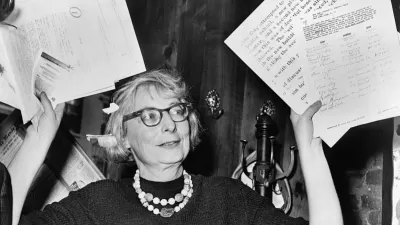Could the Los Angeles River use its own 'power broker'?
With the legacies of Robert Moses and Frederick Law Olmsted recently under discussion, Sam Hall Kaplan joins the conversation—offering a rich overview of Moses' work along with colorful anecdotes from their personal interactions. He then draws on the lessons of these two planning giants to explore major developments around Los Angeles River revitalization.
Kaplan explains, "With a bombastic glee, Moses arbitrarily imposed priorities, bent budgets, denigrated opponents, and expedited contracts. The banks and labor unions loved him. Politicians feared him. And communities hated him. He never learned to drive, preferring to be chauffeured. But if he had a favored vehicle, it was the bulldozer, as anyone standing in his way can attest. Public accountability and transparency were not common pursuits in the Depression and quarter century following, when Moses transformed New York City and state."
Despite this reputation, Kaplan wonders whether the Los Angeles River might need a personality equally able to get things done. He gives readers a sense of the "many public and private interests wading in the 51-mile course of the river," speaking with certain key figures to demonstrate the sheer number of projects and agendas at work. Given the Army Corps of Engineers' recent decision to recommend the $1.08-billion Alternative 20, promising habitat restoration and recreation for 11 miles of the waterway, Los Angeles faces the daunting task of organizing these multi-faceted efforts.
Kaplan concludes with a telling story: "I remember too well a community hearing nearly a decade ago for a particularly ambitious mixed-use school, parks and, housing project edging the river in Cypress Park... No one spoke out for housing, jobs, or a river promenade. This prompted an observer, when leaving, to confront the presumably pro-river councilman and loudly comment, 'Less consensus and more "cojones" would have been welcome.' It was a phrase that would have pleased Robert Moses and his champions."
A planner, writer, and academic, Kaplan has worked as both a design critic for the Los Angeles Times and an urban affairs reporter for the New York Times, along with teaching at Art Center College of Design, Yale, and Princeton. This exclusive article for The Planning Report reflects the writer's own opinions and research.
FULL STORY: Moses and the Future of the LA River

Alabama: Trump Terminates Settlements for Black Communities Harmed By Raw Sewage
Trump deemed the landmark civil rights agreement “illegal DEI and environmental justice policy.”

Study: Maui’s Plan to Convert Vacation Rentals to Long-Term Housing Could Cause Nearly $1 Billion Economic Loss
The plan would reduce visitor accommodation by 25% resulting in 1,900 jobs lost.

Planetizen Federal Action Tracker
A weekly monitor of how Trump’s orders and actions are impacting planners and planning in America.

Wind Energy on the Rise Despite Federal Policy Reversal
The Trump administration is revoking federal support for renewable energy, but demand for new projects continues unabated.

Passengers Flock to Caltrain After Electrification
The new electric trains are running faster and more reliably, leading to strong ridership growth on the Bay Area rail system.

Texas Churches Rally Behind ‘Yes in God’s Back Yard’ Legislation
Religious leaders want the state to reduce zoning regulations to streamline leasing church-owned land to housing developers.
Urban Design for Planners 1: Software Tools
This six-course series explores essential urban design concepts using open source software and equips planners with the tools they need to participate fully in the urban design process.
Planning for Universal Design
Learn the tools for implementing Universal Design in planning regulations.
Caltrans
Smith Gee Studio
Institute for Housing and Urban Development Studies (IHS)
City of Grandview
Harvard GSD Executive Education
Toledo-Lucas County Plan Commissions
Salt Lake City
NYU Wagner Graduate School of Public Service



























